Smart Food Safe participating in SQF Unites 2025, from March 2nd - 5th, 2025 at the Hyatt Regency, Orlando, Florida. Meet us at Booth #16 .
Smart Food Safe participating in SQF Unites 2025, from March 2nd - 5th, 2025 at the Hyatt Regency, Orlando, Florida. Meet us at Booth #16 .
Smart Food Safe participating in SQF Unites 2025, from March 2nd - 5th, 2025 at the Hyatt Regency, Orlando, Florida. Meet us at Booth #16 .
Smart Food Safe participating in SQF Unites 2025, from March 2nd - 5th, 2025
at the Hyatt Regency, Orlando, Florida. Meet us at Booth #16 .


Smart Food Safe participating in
Petfood Forum 2025, from April 28th to 30th in Kansas City, Missouri. Meet us at Booth #910.
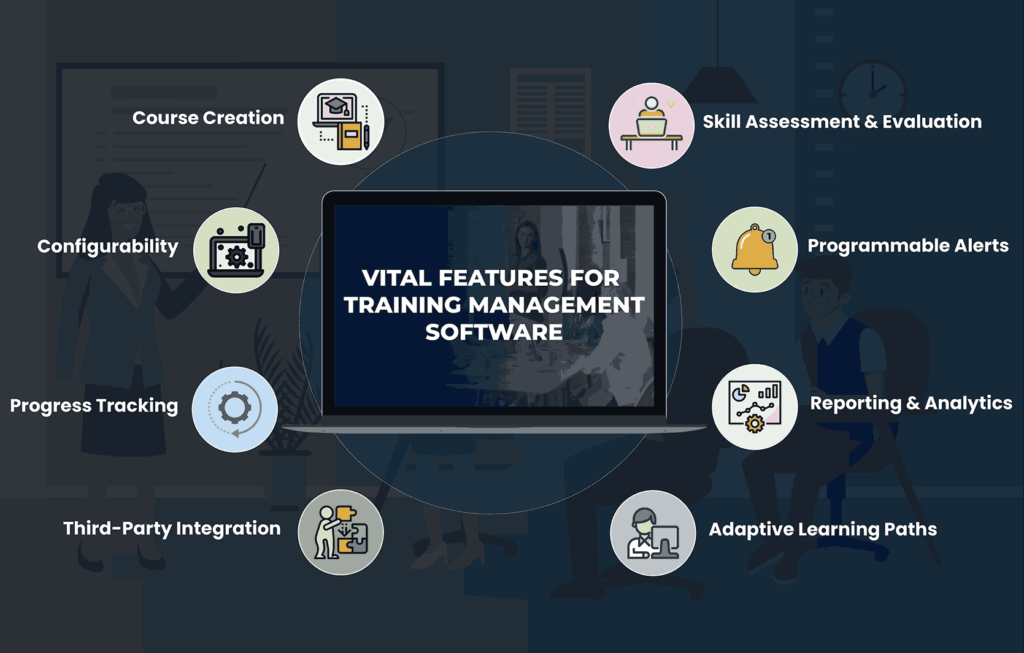
Training Management
Best Training Management
Software in 2025
Best Training Management Software in 2025
Arundhathy Shabu
May 29, 2024

Training Management
Best Training Management Software in 2025
Arundhathy Shabu
May 29, 2024
Best Training Management Software in 2025
Training Management

Arundhathy Shabu
.
May 22, 2024
Quoting Robert Kiyosaki’s words, ‘Confidence comes from discipline and training.’ It highlights a universal concept applicable across various domains, particularly evident in the realm of professional development. In a work setting, the implementation of effective training programs is pivotal, in fostering employee growth and competence.
Aiding this endeavor, training management software emerges as a potent tool, streamlining the process and ensuring thorough skill enhancement. Consequently, employees become better equipped to navigate challenges, make informed decisions, and contribute meaningfully to their respective roles, thereby solidifying the foundation for organizational success.
Understanding Training Management Software
A training management software will serve training companies and learning and development departments by optimizing training operations. It facilitates the design, organization, scaling, and maintenance of training programs. These systems cater to all learning professionals by offering functionalities to schedule, track, and evaluate training initiatives. They oversee employee training progress and certification processes.
Moreover, training management solutions can equip enterprises with tools for crafting and marketing training courses and events. Simultaneously, they empower learning and development departments with resources for training, monitoring program budgets, tracking employee performance, and more.
Backbone of a Training Management Software: Learning Management System (LMS)
The Learning Management System (LMS) provides the infrastructure necessary for organizing, delivering, and tracking training programs within an organization. At its core, an LMS functions as a centralized platform where administrators can create and manage courses, instructors can facilitate learning activities, and learners can access educational materials and assessments.
Administrators can monitor participation rates, completion statuses, and assessment scores with an LMS, gaining insights into the effectiveness of training initiatives and identifying areas for improvement. This data-driven approach facilitates informed decision-making, enabling organizations to optimize their training programs to better align with strategic goals and employee development needs. The LMS brings in a dynamic learning environment by supporting various learning formats, including self-paced modules, instructor-led sessions, and virtual classrooms, catering to diverse learning preferences and ensuring maximum engagement and retention among learners.
Vital Features for Training Management Software
Navigating the intricacies of training operations can be made easy with training management software. However, with numerous options available, discerning which features can systematize the organization’s training endeavors is paramount. Below are some critical features to look for in training management software:
- Course Creation: Craft comprehensive training catalogs tailored to company objectives. Include detailed descriptions, requirements, availability, and relevant information. Empower teams with customizable courses to enhance motivation and align with organizational goals.
- Configurability: Customize training programs to meet business needs and compliance requirements easily. Design, modify, and delete courses as needed without complexity.
- Adaptive Learning Paths: Offer guided learning routes to efficiently and comprehensively acquire knowledge. Provide self-paced and real-time options to accommodate diverse learning styles.
- Skill Assessment & Evaluation: Identify and track skills needed for performance enhancement on a collaborative training platform.
- Progress Tracking: Monitor user advancement to ensure compliance and adapt to evolving company needs. Analyze data to assess progress, engagement levels, certifications, and additional training requirements.
- Programmable Alerts: Schedule alerts for expiring qualifications to ensure regulatory compliance and keep training records up to date.
- Reporting & Analytics: Utilize reports to track engagement, training effectiveness, and compliance. Configure reports to focus on actionable insights and demonstrate best practices.
- Third-Party Integration: Smoothly integrate with existing systems such as document management and quality systems to enhance training efficiency and drive continuous improvement.
Food Safety Management Software
Boost your food business’s hygiene standards with Smart Food Safe’s tech-driven solutions—streamline 4C processes to yield optimal results, and ensure compliance effortlessly.

Food Safety Management Software
Boost your food business’s hygiene standards with Smart Food Safe’s tech-driven solutions—streamline 4C processes to yield optimal results, and ensure compliance effortlessly.
Opting for the ideal Training Management Software
Given below is a list of some front-runners in the training management software paradigm:
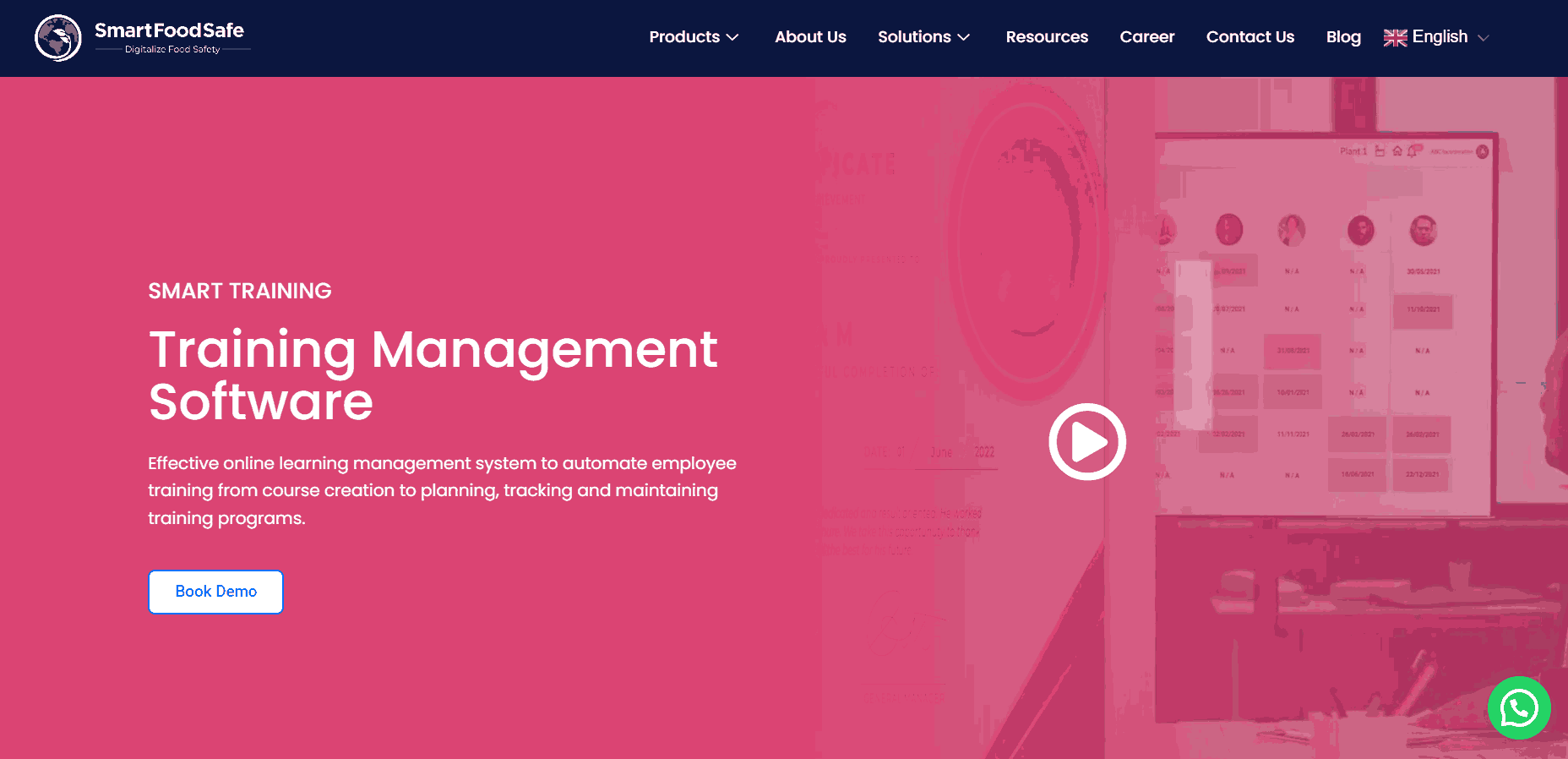
Overview
Smart Training is an effective online learning management system to automate training from course creation to planning, tracking, and maintaining training programs. Smart Training transcends conventional learning management systems, targeting a strategic commitment to your company's long-term success.
Utilizing an interactive digital platform, it enables your workforce to conveniently access top-tier training resources regardless of location or time. This enhanced accessibility eliminates geographical limitations and time constraints, fostering a fluid learning journey for all everyone.
Key Features:
- Automate Training Plans
- Track Employee Progress
- Manage Compliance Training
- Self-Paced Learning
- Group Learning Capabilities
- Centralized Content Repository
- Course Creation Tools
- Schedule Refresher Courses
- Customizable Training Programs
- Real-Time Reporting
- User-Friendly Interface
- Integration with Existing Systems
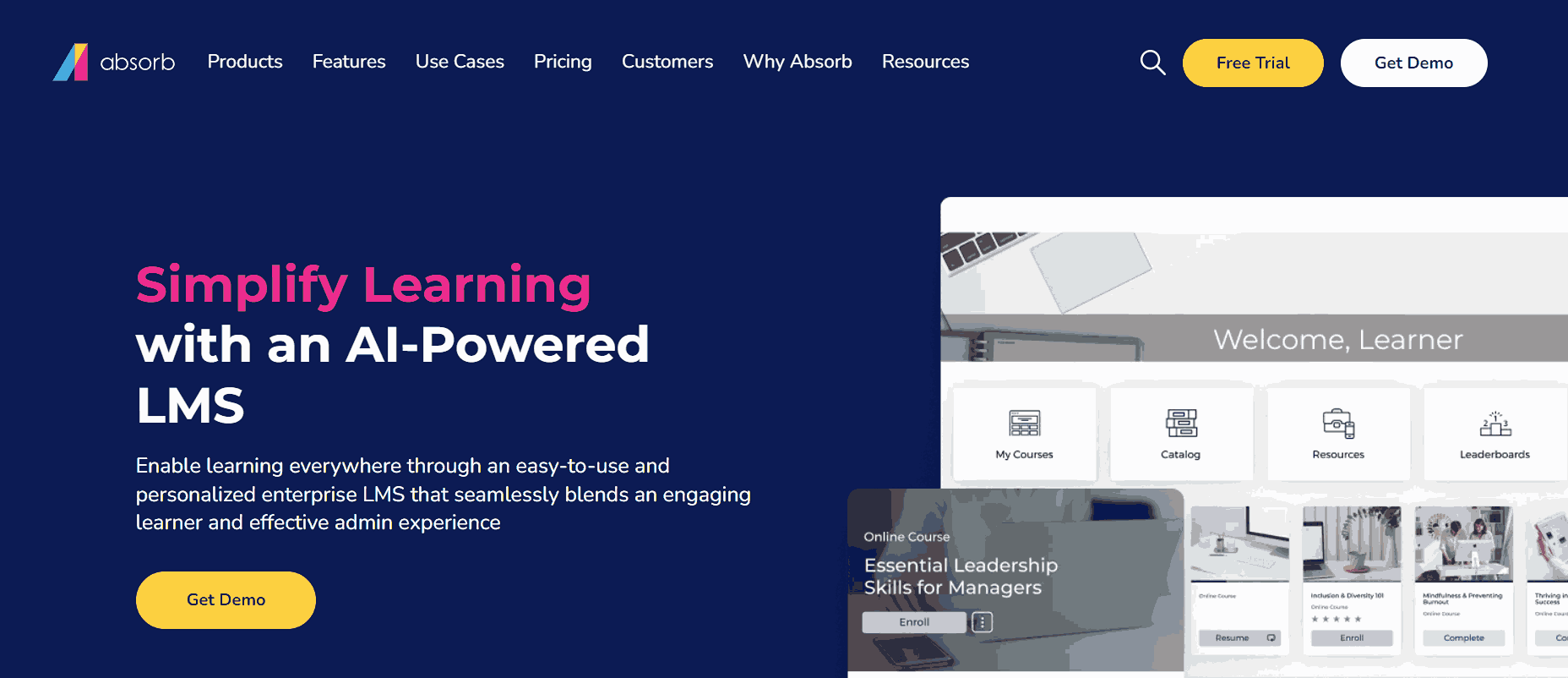
Overview
Absorb LMS strives to help organizations achieve their training goals through meaningful learning experiences that produce tangible results. It fosters deeper learner comprehension and retention through an intuitive platform that supports multimedia content formats, responsive design, social learning, branded interfaces, and more.
Key Features:
- User-friendly Interface
- Ease of Integration
- Customizability
- Reporting Functionality

Overview:
Moodle is an open-source, feature-rich, secure, and scalable learning management system that integrates seamlessly with other platforms and can be customized for any teaching or training method you choose. With fresh and intuitive interfaces, Moodle has solutions suitable for K-12, higher education, vocational training, corporates, and all types of enterprise learning.
Key Features:
- Content Creation in Various Formats
- Analytics and Reporting
- Third-Party Tool Integration
- On-the-go Learning
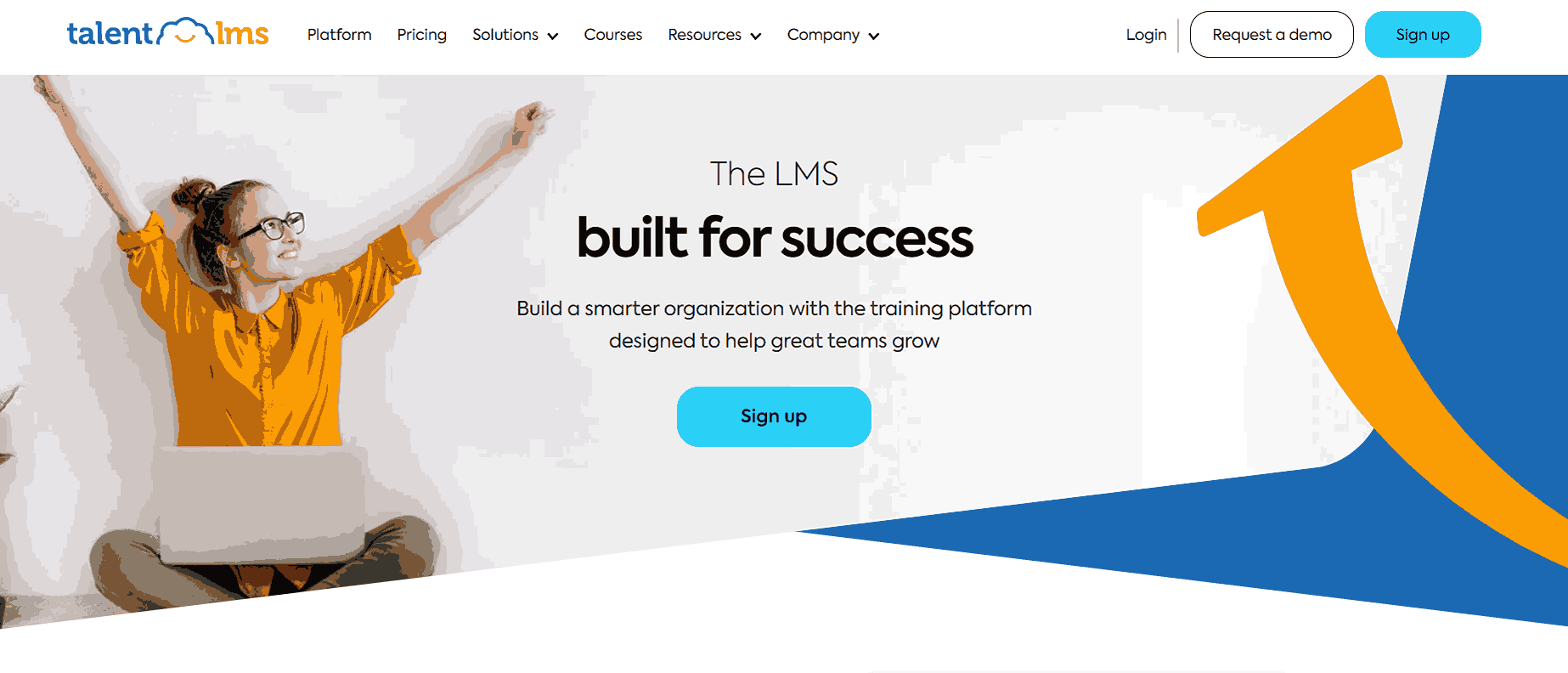
Overview
TalentLMS offers a customizable and user-friendly learning management system (LMS) designed to systematize training processes for teams and companies. With features tailored to fit seamlessly into existing workflows and backed by Epignosis, it aims to democratize training while providing expert guidance and support.
Key Features:
- Learner Progress Tracking
- Personalized Learner Experience
- Training Task Automation
- Reporting for Result Analysis
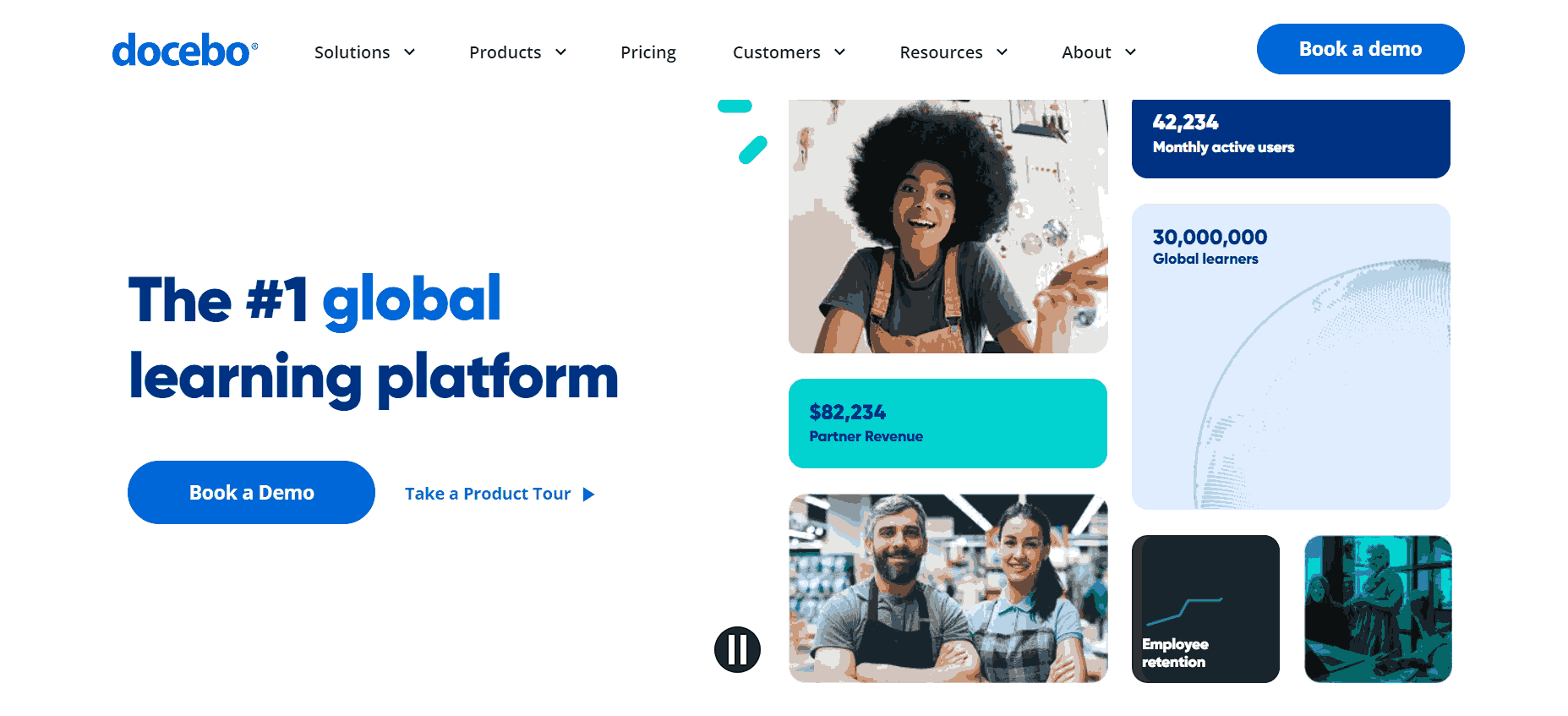
Overview
Docebo is a learning platform designed to be intuitive for admins, engaging for learners, and transformative for businesses with a key differentiator of capability for delivering a hyper-personalized learning experience to multiple audiences, including employees, customers, and partners.
Key Features:
- Centralized Learning Platform
- Customization
- Instructor-Led Training
- User Management
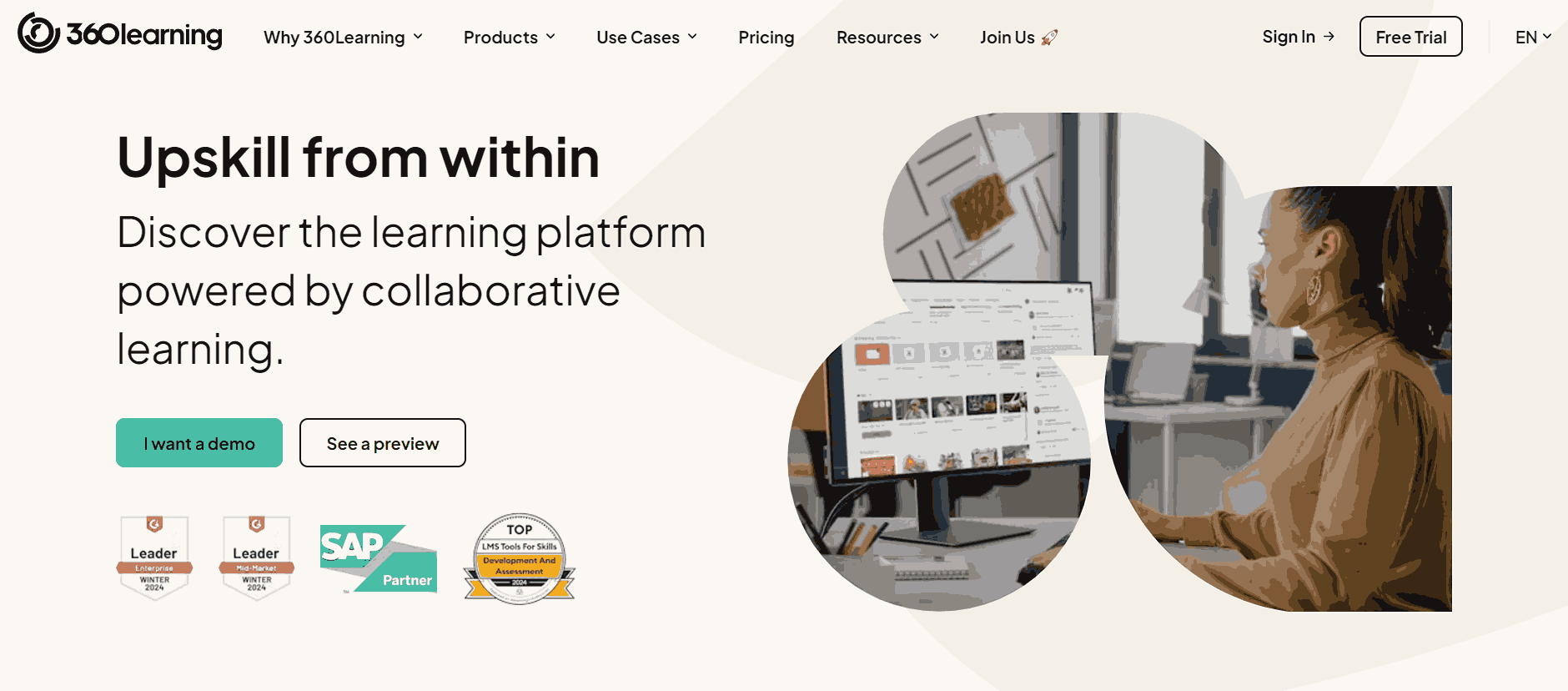
Overview
360Learning enables internal mobility to solve the talent shortage by empowering companies to upskill from within. By turning their experts into champions for employee, customer, and partner growth, companies upskill their workforce fast to meet tomorrow’s business demands.
Key Features:
- Course Builder
- Communication and Notifications
- Varied User Types
- Assignment Scheduling
How Smart Food Safe’s Smart Training Stands Out With An Innovative LMS Approach?
Leveraging the capabilities of digital technology, Smart Training brings forward a transformative instrument to augment individuals’ skill sets, guaranteeing your enterprise maintains a more adaptable and well-knowledgeable workforce. Smart Training’s LMS stands out with the following innovative functionalities:
Course Management
Create and manage training courses with ease using our platform. Develop courses from scratch or use our pre-built library, and configure course settings for a contemporary learning process. Use our drag-and-drop course creator to design layout templates with various elements and Q&A sections. Integrate documents such as PPT, PDF, and Excel into your course templates. Select from our professional, ready-to-use, customizable courses in the training library, and enhance each course with integrated knowledge assessments.
Training Programs
Develop and sustain training programs by bundling multiple courses into designated learning paths for individuals or groups. Organize and deliver these programs effectively, evaluate trainee performance upon completion, and schedule programs to meet compliance requirements. Launch programs using training records generated from your customized templates.
Customizable Training
Customize your training delivery with course settings, including duration, grading criteria, completion certificates, and other features to curate the learning experience. Integrate Q&A sections within courses to test knowledge and track progress, with options for mandatory or optional Q&A based on course requirements. Use graded assessments for scoring performance or non-graded options for feedback. Set up refresher training based on organizational needs and required frequency.
Self and Group Learning
Enhance employee knowledge with collaborative group learning features that facilitate knowledge sharing. Assign trainers and reviewers to provide instruction and feedback on specific courses. Offer onboarding and refresher training to ensure new hires and existing employees stay updated. Automatically generate and issue certificates upon course completion. Utilize customized notifications to send targeted messages with course-specific information.
Course Scheduling
Optimize course organization and allocation with a scheduling feature that follows a predefined timetable. Administrators can customize scheduling parameters to meet specific requirements. Automate course scheduling based on set criteria to streamline tasks. Set course expiration dates to ensure timely completion and encourage progress. Send timely alerts and notifications to keep learners and instructors informed about updates, deadlines, and events.
Skill Matrix
Obtain visual assessments of individual skills and competencies to track and analyze proficiency levels in courses. Monitor overall user progress with a comprehensive view of training compliance and achievements. Conduct a skill gap analysis to identify and address workforce deficiencies, customizing learning paths accordingly. Allow users to access records of completed and upcoming training to plan their learning journeys. Export and download relevant data or reports for further analysis or integration with external tools.
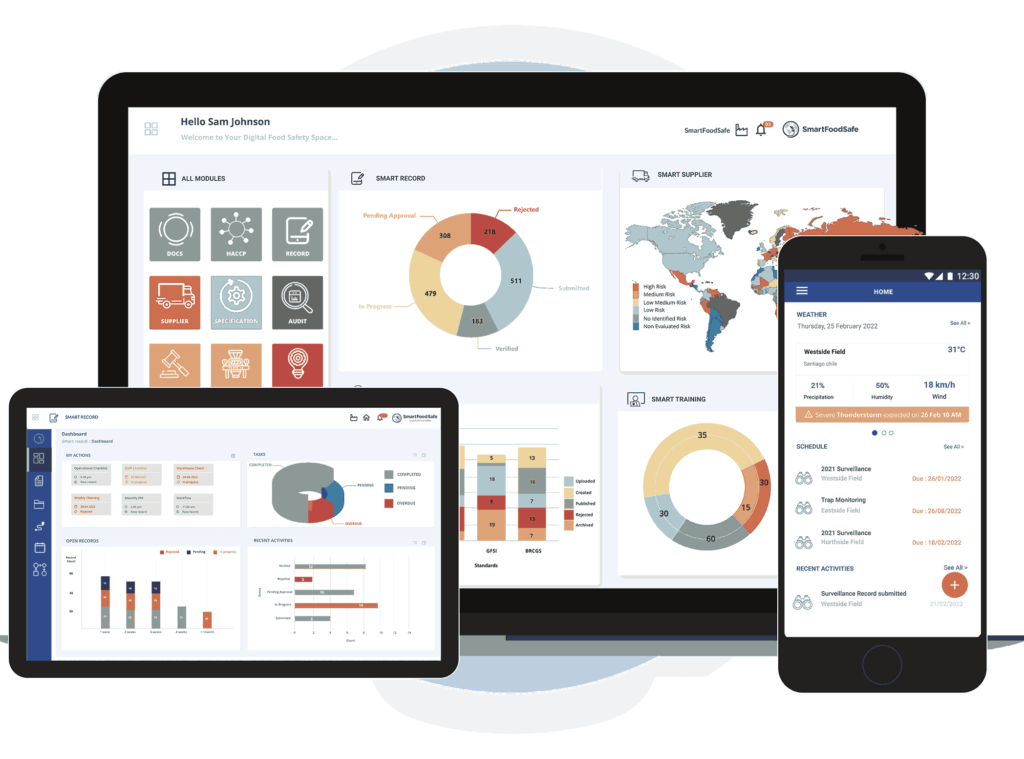
Training Management Software
Take your training programs to the next level with Smart Training through a digital learning management experience.
Quoting Robert Kiyosaki’s words, ‘Confidence comes from discipline and training.’ It highlights a universal concept applicable across various domains, particularly evident in the realm of professional development. In a work setting, the implementation of effective training programs is pivotal, in fostering employee growth and competence.
Aiding this endeavor, training management software emerges as a potent tool, streamlining the process and ensuring thorough skill enhancement. Consequently, employees become better equipped to navigate challenges, make informed decisions, and contribute meaningfully to their respective roles, thereby solidifying the foundation for organizational success.
Understanding Training Management Software
A training management software will serve training companies and learning and development departments by optimizing training operations. It facilitates the design, organization, scaling, and maintenance of training programs. These systems cater to all learning professionals by offering functionalities to schedule, track, and evaluate training initiatives. They oversee employee training progress and certification processes.
Moreover, training management solutions can equip enterprises with tools for crafting and marketing training courses and events. Simultaneously, they empower learning and development departments with resources for training, monitoring program budgets, tracking employee performance, and more.
Backbone of a Training Management Software: Learning Management System (LMS)
The Learning Management System (LMS) provides the infrastructure necessary for organizing, delivering, and tracking training programs within an organization. At its core, an LMS functions as a centralized platform where administrators can create and manage courses, instructors can facilitate learning activities, and learners can access educational materials and assessments.
Administrators can monitor participation rates, completion statuses, and assessment scores with an LMS, gaining insights into the effectiveness of training initiatives and identifying areas for improvement. This data-driven approach facilitates informed decision-making, enabling organizations to optimize their training programs to better align with strategic goals and employee development needs. The LMS brings in a dynamic learning environment by supporting various learning formats, including self-paced modules, instructor-led sessions, and virtual classrooms, catering to diverse learning preferences and ensuring maximum engagement and retention among learners.
Vital Features for Training Management Software
Navigating the intricacies of training operations can be made easy with training management software. However, with numerous options available, discerning which features can systematize the organization’s training endeavors is paramount. Below are some critical features to look for in training management software:
- Course Creation: Craft comprehensive training catalogs tailored to company objectives. Include detailed descriptions, requirements, availability, and relevant information. Empower teams with customizable courses to enhance motivation and align with organizational goals.
- Configurability: Customize training programs to meet business needs and compliance requirements easily. Design, modify, and delete courses as needed without complexity.
- Adaptive Learning Paths: Offer guided learning routes to efficiently and comprehensively acquire knowledge. Provide self-paced and real-time options to accommodate diverse learning styles.
- Skill Assessment & Evaluation: Identify and track skills needed for performance enhancement on a collaborative training platform.
- Progress Tracking: Monitor user advancement to ensure compliance and adapt to evolving company needs. Analyze data to assess progress, engagement levels, certifications, and additional training requirements.
- Programmable Alerts: Schedule alerts for expiring qualifications to ensure regulatory compliance and keep training records up to date.
- Reporting & Analytics: Utilize reports to track engagement, training effectiveness, and compliance. Configure reports to focus on actionable insights and demonstrate best practices.
Third-Party Integration: Smoothly integrate with existing systems such as document management and quality systems to enhance training efficiency and drive continuous improvement.
Food Safety Management Software
Boost your food business’s hygiene standards with Smart Food Safe’s tech-driven solutions—streamline 4C processes to yield optimal results, and ensure compliance effortlessly.

Opting for the Ideal Training Management Software
Given below is a list of some front-runners in the training management software paradigm:
 Overview
Smart Training is an effective online learning management system to automate training from course creation to planning, tracking, and maintaining training programs. Smart Training transcends conventional learning management systems, targeting a strategic commitment to your company's long-term success.
Utilizing an interactive digital platform, it enables your workforce to conveniently access top-tier training resources regardless of location or time. This enhanced accessibility eliminates geographical limitations and time constraints, fostering a fluid learning journey for all everyone.
Key Features:
Overview
Smart Training is an effective online learning management system to automate training from course creation to planning, tracking, and maintaining training programs. Smart Training transcends conventional learning management systems, targeting a strategic commitment to your company's long-term success.
Utilizing an interactive digital platform, it enables your workforce to conveniently access top-tier training resources regardless of location or time. This enhanced accessibility eliminates geographical limitations and time constraints, fostering a fluid learning journey for all everyone.
Key Features:
- Automate Training Plans
- Track Employee Progress
- Manage Compliance Training
- Self-Paced Learning
- Group Learning Capabilities
- Centralized Content Repository
- Course Creation Tools
- Schedule Refresher Courses
- Customizable Training Programs
- Real-Time Reporting
- User-Friendly Interface
- Integration with Existing Systems
 Overview
Absorb LMS strives to help organizations achieve their training goals through meaningful learning experiences that produce tangible results. It fosters deeper learner comprehension and retention through an intuitive platform that supports multimedia content formats, responsive design, social learning, branded interfaces, and more.
Key Features:
Overview
Absorb LMS strives to help organizations achieve their training goals through meaningful learning experiences that produce tangible results. It fosters deeper learner comprehension and retention through an intuitive platform that supports multimedia content formats, responsive design, social learning, branded interfaces, and more.
Key Features:
- User-friendly Interface
- Ease of Integration
- Customizability
- Reporting Functionality
 Overview:
Moodle is an open-source, feature-rich, secure, and scalable learning management system that integrates seamlessly with other platforms and can be customized for any teaching or training method you choose. With fresh and intuitive interfaces, Moodle has solutions suitable for K-12, higher education, vocational training, corporates, and all types of enterprise learning.
Key Features:
Overview:
Moodle is an open-source, feature-rich, secure, and scalable learning management system that integrates seamlessly with other platforms and can be customized for any teaching or training method you choose. With fresh and intuitive interfaces, Moodle has solutions suitable for K-12, higher education, vocational training, corporates, and all types of enterprise learning.
Key Features:
- Content Creation in Various Formats
- Analytics and Reporting
- Third-Party Tool Integration
- On-the-go Learning
 Overview
TalentLMS offers a customizable and user-friendly learning management system (LMS) designed to systematize training processes for teams and companies. With features tailored to fit seamlessly into existing workflows and backed by Epignosis, it aims to democratize training while providing expert guidance and support.
Key Features:
Overview
TalentLMS offers a customizable and user-friendly learning management system (LMS) designed to systematize training processes for teams and companies. With features tailored to fit seamlessly into existing workflows and backed by Epignosis, it aims to democratize training while providing expert guidance and support.
Key Features:
- Learner Progress Tracking
- Personalized Learner Experience
- Training Task Automation
- Reporting for Result Analysis
 Overview
Docebo is a learning platform designed to be intuitive for admins, engaging for learners, and transformative for businesses with a key differentiator of capability for delivering a hyper-personalized learning experience to multiple audiences, including employees, customers, and partners.
Key Features:
Overview
Docebo is a learning platform designed to be intuitive for admins, engaging for learners, and transformative for businesses with a key differentiator of capability for delivering a hyper-personalized learning experience to multiple audiences, including employees, customers, and partners.
Key Features:
- Centralized Learning Platform
- Customization
- Instructor-Led Training
- User Management
 Overview
360Learning enables internal mobility to solve the talent shortage by empowering companies to upskill from within. By turning their experts into champions for employee, customer, and partner growth, companies upskill their workforce fast to meet tomorrow’s business demands.
Key Features:
Overview
360Learning enables internal mobility to solve the talent shortage by empowering companies to upskill from within. By turning their experts into champions for employee, customer, and partner growth, companies upskill their workforce fast to meet tomorrow’s business demands.
Key Features:
- Course Builder
- Communication and Notifications
- Varied User Types
- Assignment Scheduling
How Smart Food Safe’s Smart Training Stands Out With An Innovative LMS Approach?
Leveraging the capabilities of digital technology, Smart Training brings forward a transformative instrument to augment individuals’ skill sets, guaranteeing your enterprise maintains a more adaptable and well-knowledgeable workforce. Smart Training’s LMS stands out with the following innovative functionalities:
Course Management
Create and manage training courses with ease using our platform. Develop courses from scratch or use our pre-built library, and configure course settings for a contemporary learning process. Use our drag-and-drop course creator to design layout templates with various elements and Q&A sections. Integrate documents such as PPT, PDF, and Excel into your course templates. Select from our professional, ready-to-use, customizable courses in the training library, and enhance each course with integrated knowledge assessments.
Training Programs
Develop and sustain training programs by bundling multiple courses into designated learning paths for individuals or groups. Organize and deliver these programs effectively, evaluate trainee performance upon completion, and schedule programs to meet compliance requirements. Launch programs using training records generated from your customized templates.
Customizable Training
Customize your training delivery with course settings, including duration, grading criteria, completion certificates, and other features to curate the learning experience. Integrate Q&A sections within courses to test knowledge and track progress, with options for mandatory or optional Q&A based on course requirements. Use graded assessments for scoring performance or non-graded options for feedback. Set up refresher training based on organizational needs and required frequency.
Self and Group Learning
Enhance employee knowledge with collaborative group learning features that facilitate knowledge sharing. Assign trainers and reviewers to provide instruction and feedback on specific courses. Offer onboarding and refresher training to ensure new hires and existing employees stay updated. Automatically generate and issue certificates upon course completion. Utilize customized notifications to send targeted messages with course-specific information.
Course Scheduling
Optimize course organization and allocation with a scheduling feature that follows a predefined timetable. Administrators can customize scheduling parameters to meet specific requirements. Automate course scheduling based on set criteria to streamline tasks. Set course expiration dates to ensure timely completion and encourage progress. Send timely alerts and notifications to keep learners and instructors informed about updates, deadlines, and events.
Skill Matrix
Obtain visual assessments of individual skills and competencies to track and analyze proficiency levels in courses. Monitor overall user progress with a comprehensive view of training compliance and achievements. Conduct a skill gap analysis to identify and address workforce deficiencies, customizing learning paths accordingly. Allow users to access records of completed and upcoming training to plan their learning journeys. Export and download relevant data or reports for further analysis or integration with external tools.

Training Management Software
Take your training programs to the next level with Smart Training through a digital learning management experience.


